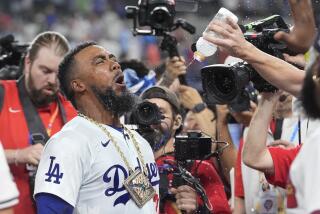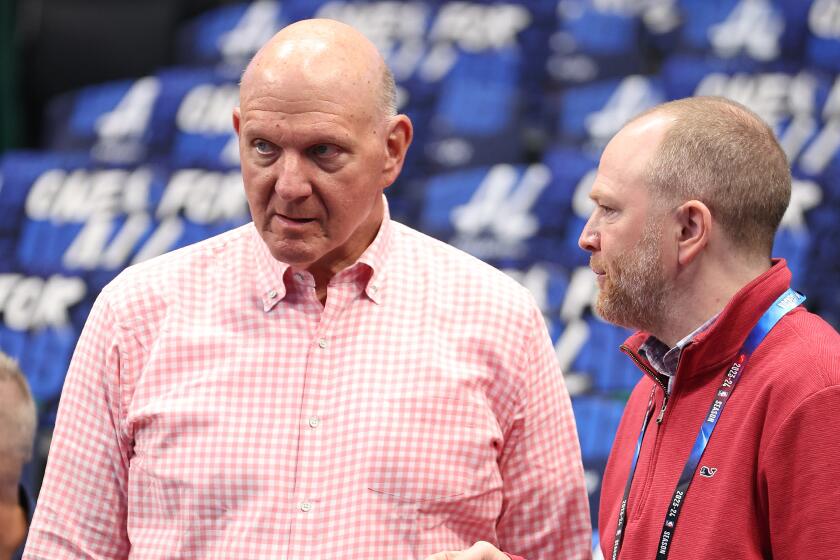‘Vulture on the Ring Post’ : Unauthorized biography of Don King paints a troubling portrait of corrupt exploitation of fighters : ONLY IN AMERICA: The Life and Crimes of Don King, <i> By Jack Newfield (William Morrow: $23; 368 pp.)</i>
The fine art of pugilism has always been part of a milieu of gamblers and gangsters, of brilliant but often shady promoters who lined their own pockets while even the best of boxers, such as Joe Louis, ended their careers near destitute. But perhaps no ringside hustler in history has exerted control over so many fighters and so utterly, appallingly, become the definition of the flamboyantly greedy matchmaker as Don King.
Veteran journalist Jack Newfield’s unauthorized biography, “Only In America: The Life and Crimes of Don King,” is a classic study of the will to power and of the corruption and broken lives that accompany it. Newfield traces King’s beginnings as a Cleveland numbers runner who served time for manslaughter and describes how he rose to fame and riches over the past two decades by way of Machiavellian maneuvers that would have done Caligula proud.
Newfield gives King his due as a “trailblazer,” the first black entrepreneur to reach the top of the fight game. But the author’s focus is on what he portrays as King’s manipulative mastery, his remarkable ability to stay above the law despite bilking boxers out of millions of dollars and leaving behind what Newfield calls an embittered “lost generation of heavyweights”--fighters like King’s first protege, the talented Jeff Merritt, who ended up a homeless crack addict.
The pattern of King’s career is one of constant wooing followed by betrayal, not only of fighters and their managers but even of his close friends such as the singer Lloyd Price, who helped the ex-convict enter the boxing business. Newfield offers grudging respect for a wheeler-dealer who has outmaneuvered world leaders and financial wizards like Donald Trump to corner most of the fight market for himself. But when it comes to morality, this is a portrait not of a mere rascal but of a conniver who will stop at nothing to get what he wants: more money and more power.
King’s audacity seems to know no bounds. Newfield tells of his sudden shift of allegiance in the midst of a bout, when, having arrived with Joe Frazier, King leaped into the ring and embraced the victorious George Foreman. He describes King crashing the funeral of Mike Tyson’s beloved co-manager, Jimmy Jacobs, whispering in the heavyweight champion’s ear at graveside and later “positioning himself to be Tyson’s father figure” by using the impressionable young man’s wife to weaken him emotionally.
Newfield recounts that when George Foreman tried to back out of his 1974 title fight with Muhammad Ali, only King’s indefatigably loquacious cajoling of Foreman--coupled with getting the government of Zaire to hold the fighter’s passport hostage--preserved the match that set King on the glory trail. As one boxing manager told Newfield, “If BS were poetry, Don King would be Shakespeare.” The author’s description of Ali’s strategic genius in defeating Foreman is a refreshing antidote to the outrage a reader feels as the seamy King saga unfolds.
Ultimately, Ali himself could not escape the promoter’s web. It was King who succeeded in inducing Ali out of retirement in 1980 to go up against his former sparring partner, then-heavyweight champ Larry Holmes. Ali, in what Newfield calls “the public flogging of a generation’s youth and idealism,” never should have entered the ring. There is a poignant scene of a shaken Holmes coming to visit his fallen idol in the hospital after defeating him, begging Ali not to fight again. Newfield’s story ends up with King cheating Ali out of more than $1 million and then, when Ali sued, using one of Ali’s closest advisers to get him to settle for $50,000 cash.
This is a book filled with insider’s intrigue on how deals are cut in the boxing world, and many allegations are as hair-raising as King’s own trademark ‘do: paying kickbacks to rig the ratings for an ABC-sponsored “American championship” tournament that would showcase nothing but boxers already under King’s banner; trying to strip the heavyweight title from Buster Douglas under false pretenses, then using the NAACP and Douglas’ own father in underhanded efforts to bring Buster into King’s corner. Newfield recounts King’s hypocrisy in attacking apartheid, then promoting a title fight between South Africa’s Gerrie Coetzee and his own fighter, Michael Dokes. When Dokes unexpectedly lost, strung out on cocaine, King stepped “right over the fallen black champion he called his son to embrace the new white champion from the land he had condemned.”
Perhaps most disturbing is Newfield’s description of the way King treated talented, now all-but-forgotten, black fighters such as Tim Witherspoon. Newfield devotes a fascinating chapter to the Witherspoon saga: King forced Witherspoon’s suspension from the fight game in order to place him under his stepson’s wing.
After Witherspoon retaliated in the courts against the Kings’ running off with most of his earnings, he was eased out of the picture because no heavyweight under King’s control would fight him.
How has King managed to evade prosecution despite what Newfield details as a host of payoffs, falsified account books and other illegal activities? Utilizing extensive interviews, FBI reports and court records, Newfield traces King’s longtime affiliation with organized crime figures including New York’s John Gotti. While these associations, he argues, are one source of King’s capacity to intimidate anyone who seeks to cross him, the promoter also seems to have been born under some malevolent lucky star. When an FBI sting operation closed in on him during the 1980s, for example, the bureau ended up backing away. Indicted for tax fraud, King managed to walk free while a close associate got convicted; King flew the jurors to a title fight in London and billed the promotion for the expense.
Finally, in 1994, with the aid of a former King accountant, the federal government indicted him again for wire fraud, which, Newfield wryly notes, “did seem a little like getting Al Capone for taxes after he had arranged dozens of underworld executions.” Ten days ago a mistrial was declared in New York when the jury deadlocked, but federal prosecutors vowed to retry King next spring. For now, though, King walked out of the courtroom smiling and saying he was “going to church.”
So--only in America--King will doubtless continue to shepherd a recently-paroled Tyson through his ring comeback. Last August in Las Vegas, his usual ubiquitous presence in tuxedo and gold jewelry, King charged $1,500 for a ringside seat and raked in millions more in pay-TV rights when Tyson decked the hapless Peter McNeeley--also part of King’s stable--in a travesty that lasted less than 90 seconds.
“Under Don King’s tutelage, Mike Tyson lost his crown, lost his money, and lost his freedom,” Newfield writes. Yet somehow Tyson is sticking with King--a Luciferian genius who epitomizes survival-of-the-shiftiest, and who seems destined to remain, as Newfield says, “the vulture on the ring post . . . sing[ing] his song of seduction.”
More to Read
Go beyond the scoreboard
Get the latest on L.A.'s teams in the daily Sports Report newsletter.
You may occasionally receive promotional content from the Los Angeles Times.






